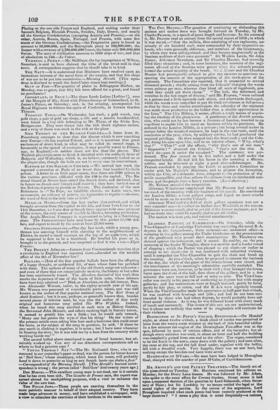'THE CITY Mserrane—The question of continuing or disbanding this ancient
and useless force was brought forward on Tuesday, by Mr. Charles Pearson, in a speech of great length and humour. In the coarse of it, Mr. Pearson read an extract from the special report of 1810 ; in which
it was stated,—" that the militia, then consisting of two regiments, no- minally of' six hundred each, were commanded by their respective co- lonels, who were generally aldermen, and members of the lieutenancy, by whom they were self-appointed, and thus became magisterially at the Sessions auditors of their own accounts." Sir Watkin Lewis, Sir John Earner, Alderman Newnham, and Sir Claudius Hunter, had severally filled these situations ; and, in some instances, the accounts of the regi- ments allowed at the Sessions were passed when the colonels present formed the actual majority of the bench. Sir J. Earner and Sir Claudius Hunter had peremptorily refused to give any answers to questions re- specting the amount or the appropriation of the stock.purse of the regiment. The Committee also reported, that it amounted to several thousand pounds ; chiefly arising from the Colonels' charging the wards seven guineas per man, whereas they hired all sorts of vagabonds, pro. vided they could get them cheap."' " The halt, the deformed, and wretches in the last stages of disease, " said Mr. Pearson, " were enlisted at a guinea and a little upwards each object, and afterwards discharged, while the wards were compelled to pay for fresh substitutes at full prices ; so that by these and similar contrivances the colonelcy of the regiment was made more productive to the holder than a similar appointment in the Line." The City Militia, it seems, affords a ready means of acquir- ing the freedom of the great town. A gentleman of the Jewish persua. sion, who could not by law become a freeman of London, resorted to an expedient to enable him to carry on business within its precincts. He enlisted in the London Militia, as a private ; but being several inches in stature below the standard' measure, he kept in the rear rank, until the conclusion of the year, when, by military service, he had purchased the required privilege. He then stepped into the front rank ; and the Colo- nel, fixing his eyes upon him, said to an inferior officer, " Why, what's that ?" " That l" said the officer, " v that's one of our men."
" Impossible! " observed the Colonel ; ••• that's not tine size. It won't do—pass it under the standard." The ceremony was per- formed. The Jew proved to be five inches and a half under the recognized height. He had left his house in the morning a etizen. soldier, and he returned at night a good citizen-fishmonger. Mr. Pearson concluded by praying the Court to appoint a Committee to confer with his Majesty's Ministers, and to propose the formation, within the City, of a domestic force, adequate ta the protection of the public tranquillity, and thus relieve the citizens from an intolerable nui. sauce, and the people from a heavy taxation. (Lovel cheering.) Mr. Tickner seconded the proposition.
Alderman Winchester complained that Mr. Pearson had mixed up too much of the amusing with the business of his speech. He considered the London Militia a ennsteallant corps, and hoped no more attacks would be made on its woethye.Colonel.
Alderman Wood said the field of their gallant exertions was not a very extended one—it reeched no farther than Woolwich at the utmost. Ministers were extremely glad to get rid of the former regiment, and he had TIO doubt they would be equally glad to get rid of this.
The motion was then put, and carried unanimously.


























 Previous page
Previous page